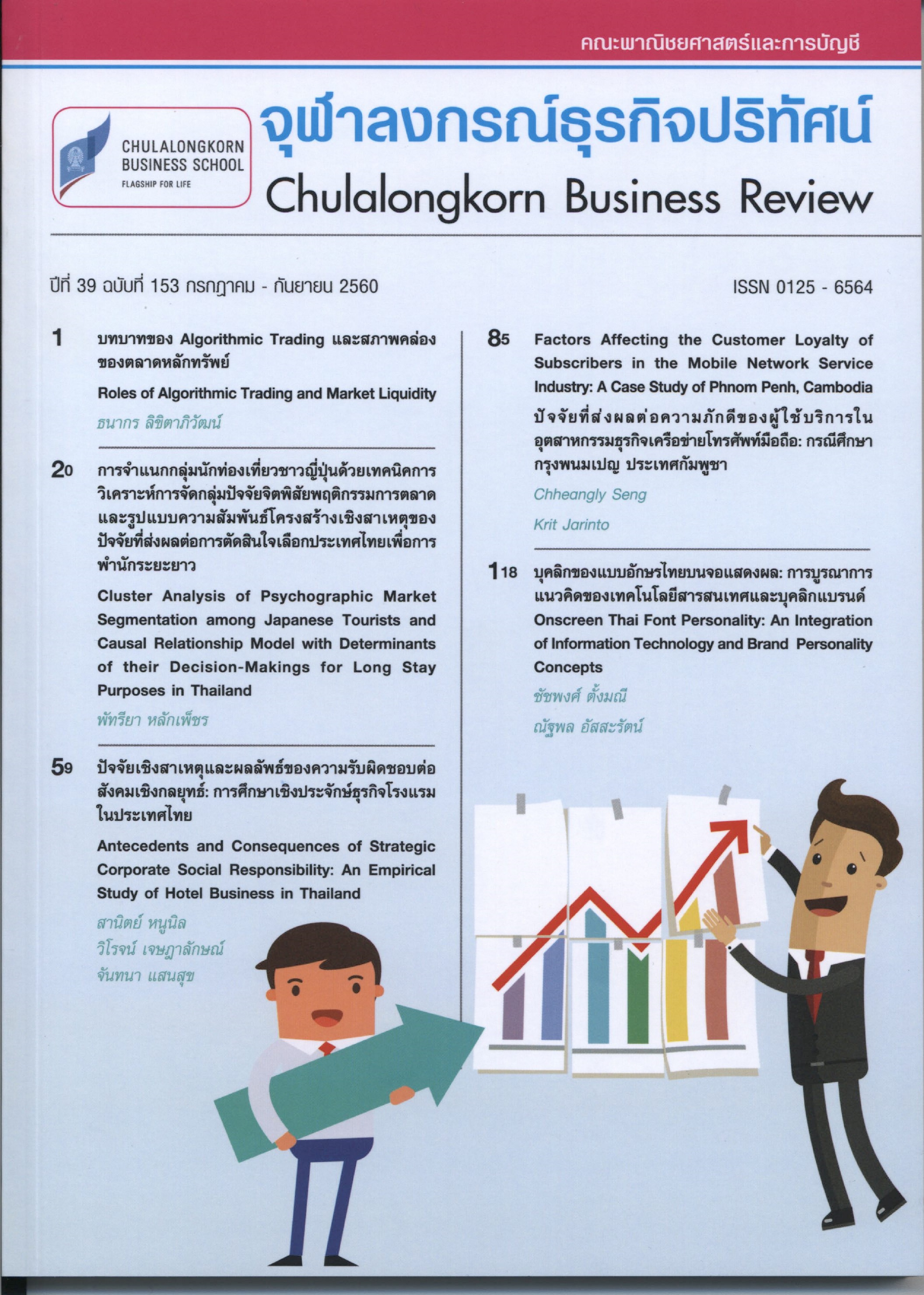การจำแนกกลุ่มนักท่องเที่ยวชาวญี่ปุ่นด้วยเทคนิคการวิเคราะห์การจัดกลุ่มปัจจัยจิตพิสัยพฤติกรรมการตลาดและรูปแบบความสัมพันธ์โครงสร้างเชิงสาเหตุปัจจัยที่ส่งผลต่อการตัดสินใจเลือกประเทศไทยเพื่อการพำนักระยะยาว
Main Article Content
Abstract
บทคัดย่อ
การวิจัยครั้งนี้มีวัตถุประสงค์เพื่อ 1) จัดกลุ่มนักท่องเที่ยวชาวญี่ปุ่นที่เลือกสถานที่ในประเทศไทยเพื่อพำนักระยะยาวตามรูปแบบการดำเนินชีวิต 2) ศึกษาพฤติกรรมการท่องเที่ยว และความคิดเห็นเกี่ยวกับการตัดสินใจเลือกสถานที่ในประเทศไทยเพื่อพำนักระยะยาวในแต่ละกลุ่มนักท่องเที่ยวชาวญี่ปุ่น และ 3) รูปแบบความสัมพันธ์โครงสร้างเชิงสาเหตุของปัจจัยที่ส่งผลต่อแนวโน้มการตัดสินใจเลือกสถานที่ในประเทศไทยเพื่อพำนักระยะยาวขอนักท่องเที่ยวชาวญี่ปุ่น ระเบียบวิธีการวิจัยเป็นแบบผสมผสาน (Mixed Methodology) ผลการวิจัยสรุปได้ว่า กลุ่มนักท่องเที่ยวชาวญี่ปุ่น (นทญ.) ที่เลือกสถานที่ในประเทศไทยเพื่อพำนักระยะยาวสามารถจัดกลุ่มได้ 3 รูปแบบการดำเนินชีวิต ได้แก่ กลุ่ม นทญ. “บำเพ็ญประโยชน์ยึดอนุรักษ์นิยม” กลุ่ม นทญ. “เน้นกิจกรรมนันทนาการในครอบครัว” และกลุ่ม นทญ. “รักษาเอกลักษณ์รสนิยมส่วนตัว”
ความสัมพันธ์เชิงสาเหตุกล่าวสรุปได้ว่า “แนวโน้ม การตัดสินใจเลือกประเทศไทยเพื่อการพำนักระยะยาวของนักท่องเที่ยวชาวญี่ปุ่น กลุ่ม นทญ. “บำเพ็ญประโยชน์ยึดอนุรักษ์นิยม” การตัดสินใจเลือกสถานที่ในประเทศไทยเพื่อพำนักระยะยาวจะได้รับอิทธิพลจากปัจจัยกลยุทธ์เพื่อเพิ่มมูลค่าในผลิตภัณฑ์สินค้าและบริการ กลุ่มที่ 2 คือ กลุ่ม นทญ. “เน้นกิจกรรมนันทนาการในครอบครัว” การตัดสินใจเลือกสถานที่ในประเทศไทยเพื่อพำนักระยะยาวจะได้รับอิทธิพลจากปัจจัยการบริหารจัดการของสถานประกอบการและกลุ่มที่ 3 “กลุ่มรักษาเอกลักษณ์รสนิยมส่วนตัว” ต่างขึ้นอยู่กับปัจจัยทางการตลาด ที่ระดับสถิตินัยสำคัญ 0.05 ดังนั้นผู้ประกอบการธุรกิจโรงแรมและที่พักกลุ่มนักท่องเที่ยวเพื่อการพำนักระยะยาวควรปรับกลยุทธ์ทางการตลาดให้ตรงตามความต้องการที่หลากหลายของนักท่องเที่ยวชาวญี่ปุ่นกลุ่มศักยภาพการซื้อสูงเพื่อส่งเสริมการเลือกประเทศไทยเป็นประเทศที่เป็นบ้านหลังที่สองของนักท่องบเที่ยวด้วยการบริหารจัดการที่มีประสิทธิภาพ นอกจากนี้ผู้ประกอบการโรงแรม ธุรกิจนำเที่ยวและที่พัก ควรยกระดับขีดความสามารถในการแข่งขันในผลิตภัณฑ์การท่องเที่ยวและบริการด้วยการยกระดับคุณภาพการบริการแบบเบ็ดเสร็จ ครบวงจร
Abstract
The objectives of this study were 1) to segment Japanese Long Stay tourists into groups based on their lifestyles, 2) to study each segment’s behaviour and opinion toward their decision-making on long-stay purposes and, 3) to examine causal relationship of determinant factors that have effect on the decision-making on Japanese tourists travelling for Long Stay purposes in Thailand. This study was conducted by mixed methodology. The findings revealed that groups of Japanese tourists who come to Thailand for long-stay purposes can be classified into 3 groups based on their different lifestyles: conservative activists, fun-seekers with family and luxury relaxers.
A causal relationship were found that conservative activists made their decisions choosing Thailand for their Long Stay purposes based on value-added tourism products and services while the fun-seekers with families focused on administrative aspects and the luxury relaxers are dependent on marketing factors at the statistical significant 0.05. As a matter of facts,, hotel and accommodation entrepreneurs who have targeted this tourist segments sectors should customize marketing strategies to accommodate Japanese upscale tourists based on their different needs and promote Thailand as Japanese tourists’ second home country with an effective administrative systems. Also, the aforementioned business entrepreneurs should upgrade the competitive products and services with the quality of the integrated one-stop services.
Article Details
Opinions and discussions in papers published by the Creative Business and Sustainability Journal (CBSJ) are deemed as personal opinions and the responsibility of the writers. They are not the opinions or responsibility of the Chulalongkorn Business School of Chulalongkorn University.
Papers, content, information etc. appearing in the Journal are deemed to be the copyright property of the Chulalongkorn Business School of Chulalongkorn University. Anybody or any organization that wishes to publish any part of them or use them in any way must obtain written permission from the Chulalongkorn Business School, Chulalongkorn University.


